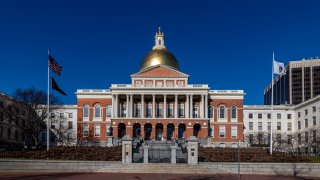
Community organizations serving some of the state's neediest residents, as well as housing and mental health care providers, say they are still waiting to receive their state funding promised months ago in the fiscal 2024 budget.
While the Legislature voted in October to restore millions of dollars that Gov. Maura Healey vetoed, leaders of four organizations told the News Service the funds have yet to start flowing or be committed through contracts with the state.
Halfway into the fiscal year, the financial uncertainty has hampered their organizations' ability to roll out their planned programs and services — and made some leaders question whether budget cuts could be on the horizon.
Healey signed the roughly $56 billion state budget package in August, and returned vetoes that legislators took up after their summer break. Asked why the money has yet to be distributed to certain organizations, and whether it was due to revenue concerns or budget cuts, a Healey administration spokesperson provided a statement to the News Service Tuesday afternoon that provided little clarity.
Get Boston local news, weather forecasts, lifestyle and entertainment stories to your inbox. Sign up for NBC Boston’s newsletters.
"Agencies developed their annual spending plans in early fall following enactment of the FY24 budget," Executive Office of Administration and Finance spokesman Matt Murphy said. "After the Legislature voted on overrides in October, impacted agencies reengaged with the spending plan process to make necessary adjustments. That process is underway and expected to conclude in the coming weeks."
Murphy, asked whether organizations will be receiving their money in the coming weeks, added, "Depending the agency’s spending plan, the funds will be released accordingly. The precise timing is part of the process."
About two dozen community action agencies are waiting for A&F to release $7.7 million for anti-poverty services, including for food, mental health services, transportation and English-language classes to support the surge of new arrivals.
Local
In-depth news coverage of the Greater Boston Area.
The money would also support those agencies' efforts to help Bay Staters find housing, avoid evictions and apply for public benefits, said Joe Diamond, executive director of the Massachusetts Association for Community Action (MASSCAP).
Diamond said this is the longest delay he's experienced from a state budget in three decades. Healey had moved to veto the entire line item, saying the money was tied to the COVID-19 pandemic.
"Our expectation is that the administration should, at this point, be releasing the resource because the budget does have the force of law," said Diamond, whose association represents 23 community action agencies. "What we understand is that the spending plan that A&F was developing did not include the vetoed items, but then when they were overridden, A&F needed to restart its spending plan process. According to folks at A&F, that's why the resource has not been released."
"Six months into the fiscal year, it's very disruptive," he added. "We have a concern that the administration may be preparing for cuts. And we don't know this, but we're just not sure, and so that's become a concern for us, as well."
For the first five months of fiscal 2024, revenues have come in lower than state budget authors expected. Collections so far are $627 million short of estimates that budget writers had used when developing their annual spending plans.
Meanwhile, an explosion of new arrivals in Massachusetts is driving up emergency shelter costs, with the Healey administration predicting a $1 billion price tag this fiscal year and next fiscal year. Officials want to use $700 million from a state escrow account to handle some of the funding deficiencies.
Healey last month said she's not considering unilateral midyear spending reductions, known as 9C cuts.
"No. No, we're going to manage the situation," Healey had told the News Service as she acknowledged slowing revenue collections.
The governor added, "We have a record amount in the stabilization fund. And we're going to just have to plan and evaluate as we prepare our next budget. That's what we're going to do, we're going to manage the situation."
Murphy, the A&F spokesman, did not mention budget cuts when asked whether the office had directed executive agencies to manage or rebalance their budgets due to revenue collections, implemented spending freezes or issued any bulletin dealing with spending directives.
"The Executive Office for Administration and Finance is constantly engaged with Executive Branch agencies on spending in any given fiscal year and we continue to monitor FY24 revenue trends," Murphy said.
Kathy Marchi, CEO of Samaritans, Inc., said concerns about potential 9C cuts have affected operations at Hey Sam, a peer-to-peer texting service for young adults that's boasted a 100 percent success rate at de-escalating conversations among people with a high risk of suicide and not involving emergency services. Healey had cut the Hey Sam money and pointed to another budget item investing more than $8 million to implement a statewide suicide prevention plan.
Fearful about not receiving the money for Hey Sam, Marchi said Samaritans is cautious about spending thousands of dollars on social media campaigns, which are linked to a significant boost in people using the service. Marchi said she's also been unable to hire new staff or recruit more volunteers without a guaranteed funding stream.
Marchi said she's repeatedly sought updates from Department of Public Health and Healey administration officials.
"They're working on the balance — they're re-budgeting and needing to balance, which makes sense," Marchi said of the responses she's heard from officials. "The challenge we'll face ultimately at some point when it all shakes out — if they approve it as it's been overridden, if they make broad sweeping cuts, whatever it is -- we will at this point have six months to spend the money. We're not spending at a pace of like knowing you have it, and then you can hire the folks, put out the promotion."
Housing providers looking to secure flexible funding to support about 150 to 200 additional units of permanent supportive housing units are also enmeshed in mysterious hold on funds.
Joyce Tavon, CEO of the Massachusetts Housing and Shelter Alliance, said the nonprofit has opened applications to distribute a new round of funding for the Home and Healthy for Good program, which closes financial gaps tied to building, opening and running affordable housing projects with wraparound services.
But plans to "get this money out the door" in the next few weeks are on hold, Tavon said, due to a delay in the Executive Office of Housing and Livable Communities providing an updated contract with the alliance. In her veto, the governor had reduced HHG funding by $2.5 million to the "amount projected to be necessary," leaving the program with about $6.4 million.
"Alarm bells started to go off right in the week before Christmas," Tavon said of the contract delay, as she invoked a recent meeting involving a colleague and another housing provider, who also seemed to be in limbo following the Legislature's veto overrides.
"We haven't been laying off staff or making cuts, but now we're halfway through the year, and it's like, what's going on here?" said Tavon, who described the delay as "very unusual."
She lamented that Massachusetts is in a "desperate housing crisis" and unsheltered homelessness is on the rise.
"This is where we're holding up the funds?" Tavon said. She added, "Certainly what happens is, the more projects that have gaps, the more they're delayed, and then the more they're delayed, the more that drives up costs."
Laura Meisenhelter, executive director of North Shore Community Action Programs, said waiting to receive more than $440,000 from the state is "definitely problematic."
Her organization uses state dollars to help people who are chronically homeless but do not qualify for state shelter, such as by paying for their hotel stays. This year's funding would have also covered raises for about 90 employees, including entry-level workers who are "one misstep away from disaster," said Meisenhelter, who's also the president of MASSCAP's board of directors.
Meisenhelter said she discussed the funding issue before Thanksgiving with Lt. Gov. Kim Driscoll, who said she would look into the situation. Meisenhelter said it's hard to believe that budget cuts could be derailing the delivery of state money.
"They have billions of dollars in the rainy day fund," she said. "I can't believe that we're that short in revenue."



